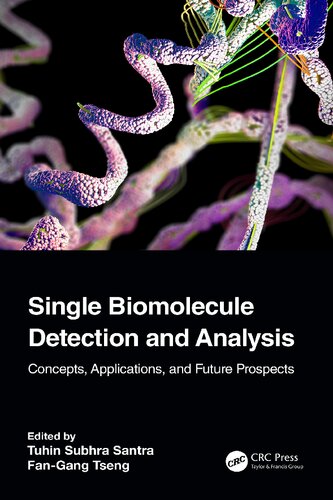

Most ebook files are in PDF format, so you can easily read them using various software such as Foxit Reader or directly on the Google Chrome browser.
Some ebook files are released by publishers in other formats such as .awz, .mobi, .epub, .fb2, etc. You may need to install specific software to read these formats on mobile/PC, such as Calibre.
Please read the tutorial at this link: https://ebookbell.com/faq
We offer FREE conversion to the popular formats you request; however, this may take some time. Therefore, right after payment, please email us, and we will try to provide the service as quickly as possible.
For some exceptional file formats or broken links (if any), please refrain from opening any disputes. Instead, email us first, and we will try to assist within a maximum of 6 hours.
EbookBell Team

4.1
10 reviewsThis collection discusses various micro/nanodevice design and fabrication for single-biomolecules detection. It will be an ideal reference text for graduate students and professionals in diverse subject areas including materials science, biomedical engineering, chemical engineering, mechanical engineering, and nanoscience.
This book-
Single Biomolecule Detection and Analysis covers single-biomolecule detection and characterization using micro/nanotechnologies and micro/nanofluidic devices, electrical and magnetic detection technologies, microscopy and spectroscopy techniques, single biomolecule optical, and nanopore devices. The text covers key important biosensors-based detection, stochastic optical reconstruction microscopy-based detection, electrochemical detection, metabolic engineering of animal cells, single-molecule intracellular delivery and tracking, terahertz spectroscopy-based detection, total internal reflection fluorescence (TIFR) detection, and Fluorescence Correlation Spectroscopy (FCS) detection. The text will be useful for graduate students and professionals in diverse subject areas including materials science, biomedical engineering, chemical engineering, mechanical engineering, and nanoscience. Discussing chemical process, physical process, separation, sensing, imaging, sequencing, and analysis of single-molecule detection, this text will be useful for graduate students and professionals in diverse subject areas including materials science, biomedical engineering, chemical engineering, mechanical engineering, and nanoscience. It covers microscopy and spectroscopy techniques for single-biomolecule detection, analysis, and their biomedical engineering applications.